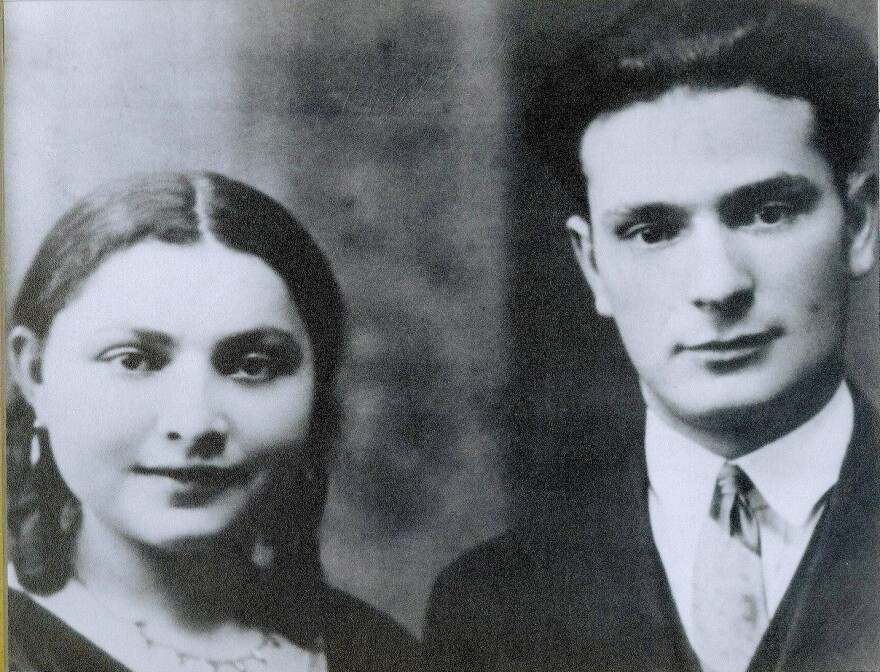During the Holocaust, people often turned a blind eye to the horrific fate of their Jewish neighbors and acquaintances. But there were also many who took it upon themselves to save Jewish men, women, and children, despite the grave danger it placed upon them and their families.
Yad Vashem in Jerusalem--the world's center for researching and documenting the Holocaust--has deemed these heroes as the Righteous Among The Nations. A traveling exhibit to honor them has landed at the University of Nevada, Reno and will be up through August 27th. It's called I Am My Brother's Keeper and Reno Public Radio News has devoted an entire hour to sharing some of the powerful stories behind this exhibit.
Below, you'll find audio to the entire hour-long program, along with various excerpts.

The Righteous Among The Nations program includes a massive, and still growing, online database where you can search for rescuers or the rescued and find their stories, photo galleries, and in some cases, recorded testimonials.
Two of these rescuers were the parents of Reno resident Julia Oversloot-Berg. They were honored by the Yad Vashem Holocaust center in Israel back in 1975 as being what is called Righteous Among The Nations. Julia has since written a book called Decency and Luck: Two Dutch Couples During World War II to share her parents’ story. To learn more, I spoke to Julia.
Julia's parents, Jacob and Jentle Oversloot, saved a Jewish couple named Emmy and Leo Krell. Their son Robert Krell also survived the war and is now an esteemed psychiatrist in Vancouver as well as an international speaker on the Holocaust. He has devoted his career to counseling Holocaust survivors like himself, along with their children. He joins us now by phone.
Our final interview is with Leon Malmed a child of the Holocaust. Unlike Robert Krell, Leon’s parents did not survive the war. Leon invited me to his home in South Lake Tahoe to share the story of how his parents were taken and of the family downstairs—the Ribouleaus—who took in both Leon and his sister Rachel.

The Ribouleaus were honored as being Righteous Among the Nations back in 1977. It would be another thirty years before Leon and his sister learned the fate of their parents. For months after the war, the children held out hope that their parents were in another country and would soon return. Eventually, they were told about the death camps.
In 2007, the German government finally released millions of Nazi documents making up the so-called Holocaust Archives. From those documents, Leon and his sister discovered that ten days after being arrested their parents were taken to Auschwitz. Their mother was never tattooed at the camp, which most likely means she died in transport or was murdered upon arrival. Their father was tattooed and they know he was still alive more than two years later in September of 1944, just a few months before that camp was liberated.
Leon Malmed did not talk to anyone—not even his sister—about the Holocaust for sixty years. When he finally did open up, he ended up writing a book, “We Survived…At Last I Speak,” and now he talks about it all the time, making a special effort to meet with area schoolchildren. His hope is that the more we talk about atrocities like the Holocaust, the less likely they are to happen again.
This radio program also includes two excerpts from survivor testimonials recorded by the USC Shoah Foundation, which has recorded 52,000 eyewitness accounts of the Holocaust. The first is from Sarah Rigler, who recounts a terrifying ordeal that took place when she was 16 and on a Jewish death march in Poland. It was January of 1945 and seeing the hopelessness of the situation, Sarah’s mother urged her to run away. Sarah did not get far before local police officers stopped her. In fact, she was close enough for her mother to witness what unfolded next.
The second testimonial is from survivor Peter Feigl who stumbled upon a tiny village in France that was a unique safe haven for Jews.




